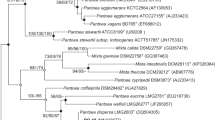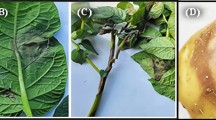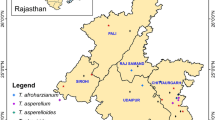Abstract
IN potato breeding trials conducted here extensive investigations are required to determine the relative resistance of selected seedlings to the common scab disease caused by Streptomyces scabies (Thaxt.) Waksman and Henrici. The tissue-culture technique1,2 for establishing a ready source of aseptic tubers potentially offers a rapid and convenient method for indexing their resistance and for studies on the host–parasite interactions. To evaluate this technique for studies on the common scab disease, tubers were produced in vitro using etiolated stolons1 and aerial stem nodes of greenhouse-grown plants3. White's amended medium, containing 10 per cent sucrose for etiolated sprouts and 8 per cent sucrose for stem nodes, was used.
This is a preview of subscription content, access via your institution
Access options
Subscribe to this journal
Receive 51 print issues and online access
$199.00 per year
only $3.90 per issue
Buy this article
- Purchase on Springer Link
- Instant access to full article PDF
Prices may be subject to local taxes which are calculated during checkout
Similar content being viewed by others
References
Barker, W. G., Science, 118, 384 (1953).
Barker, W. G., and Page, O. T., Science, 119, 286 (1954).
Lawrence, C. H., and Barker, W. G. (in the press).
Author information
Authors and Affiliations
Rights and permissions
About this article
Cite this article
LAWRENCE, C., BARKER, W. Pathogenicity of Streptomyces scabies on Potato Tubers cultured in vitro. Nature 199, 509–510 (1963). https://doi.org/10.1038/199509a0
Issue Date:
DOI: https://doi.org/10.1038/199509a0
Comments
By submitting a comment you agree to abide by our Terms and Community Guidelines. If you find something abusive or that does not comply with our terms or guidelines please flag it as inappropriate.



